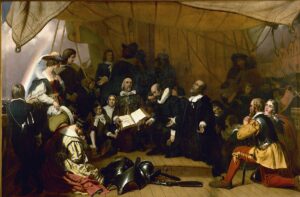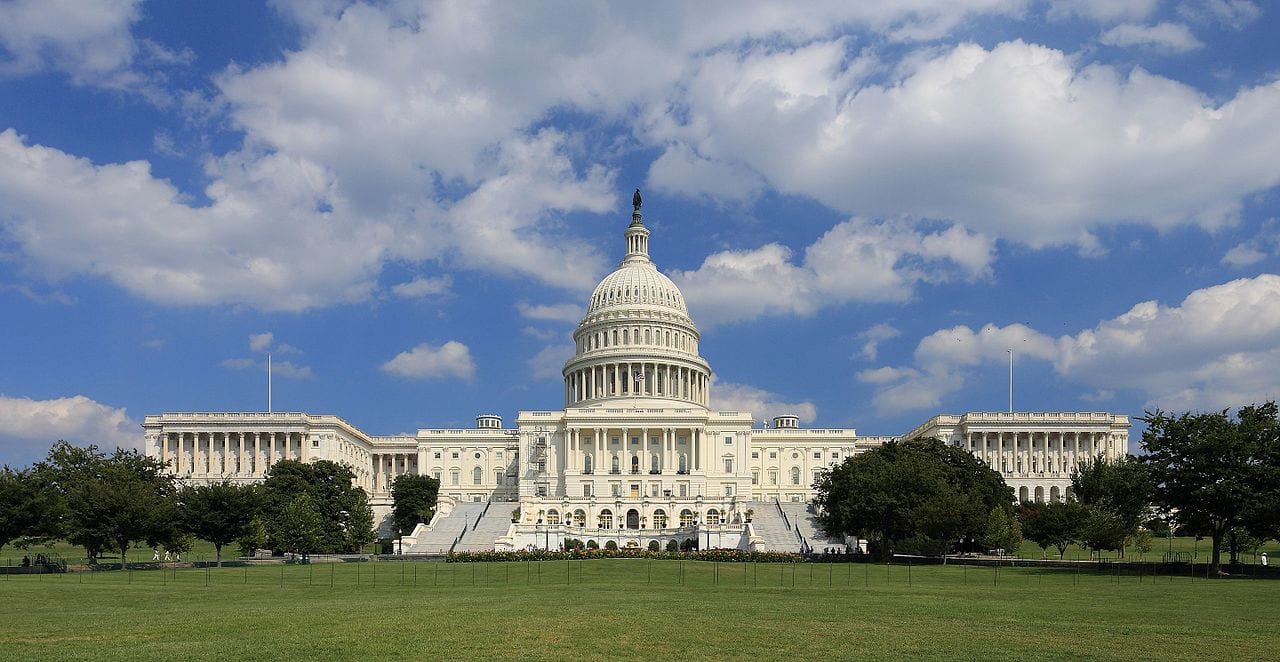
Wilson's Failure? The Treaty of Versailles
“The 11th hour of the 11th day of the 11th month…” Is there a U.S. History teacher who hasn’t recited this phrase while discussing World War I and the Armistice that promised its end? There is, however, another date worthy of mention in this discussion. It is November 19, 1919, on which date the United States Senate did something it had never done before; it rejected a peace treaty, specifically the Treaty of Versailles. Why? Certainly, every American wanted peace. WWI had been a horror show featuring terrible new weapons like the machine gun, the tank, and deadly gases that sent young Americans home horribly disfigured or in coffins. Why then would the Senate reject the treaty ending it all?
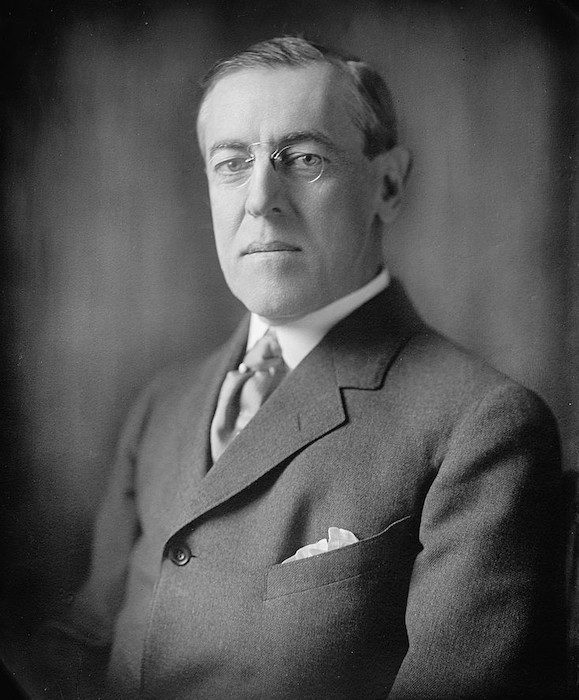
The answer comes in two major parts. One is a genuine reaction against Article 10 of the Treaty of Versailles (establishing a League of Nations) that conservative senators believed violated the sovereignty of the United States. At the same time, attention must be paid to the single-minded (bordering on hubristic) approach taken to the treaty by then-President Woodrow Wilson. It is hard to follow the chain of events leading to the vote without noting several serious missteps by Wilson that doomed his peace plans pretty much from the beginning.
Wilson’s “Fourteen Point” Plan
The United States formally entered WWI in April of 1917, and by January of the next year, President Wilson had codified his plans for “peace without victory” and presented his “Fourteen Points” to Congress and the world. The initial reaction was mixed. The Allied Powers approved of most of the plan, but raised serious questions about several issues, especially freedom of the seas and reparations. Wilson, however, was nothing if not persistent. Following the Armistice, he decided to go to Paris to present his case in person (the first time a sitting president would make such a trip), demonstrating how deeply Wilson felt that he alone could present America’s position in these negotiations.
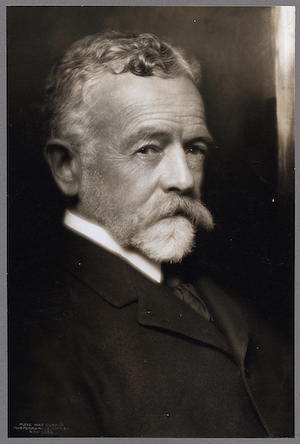
Wilson’s approach influenced the makeup of the U.S. delegation selected to participate in the Paris negotiations. (The Treaty was only signed at the Palace of Versailles; the negotiations took place in Paris.) In the mid-term elections of 1918, the Republican Party had taken control of both houses of Congress, with Henry Cabot Lodge, long Wilson’s adversary, taking the chair of the Foreign Relations Committee. Given that Article II, Section 2 of the U.S. Constitution requires treaties to be passed “with the advice and consent” of the Senate, including Lodge in the peace conference would have been a smart move by the President. It didn’t happen. In fact, no Republican was included in the negotiating team at all, nor had any been involved in crafting foreign policy in the Wilson administration.
Wilson at Versailles
Wilson’s sense of his personal value to the peace process only increased as he was received with great celebration and honors on his arrival in Europe. In Great Britain, he was feted at a royal dinner, the first held since the war had begun, and in Italy, American troops (and many Italian citizens) gave the President a hero’s welcome. His counterparts at the table at Versailles did not quite share such enthusiasm. For one, Wilson’s personal style grated on their nerves. French Prime Minister Georges Clemenceau was overheard to say, “Mr. Wilson bores me with his Fourteen Points; why, God Almighty has only 10!” It’s also worth remembering that after the Franco-Prussian War, France had been required to pay heavy indemnities to Prussia in both land and gold, so it was optimistic, to say the least, to expect them to abandon similar claims after this war. Finally, there was also the feeling that while the U.S. definitely made a difference in the war, it had not suffered the losses in soldiers and property borne by the other Allies and should therefore not lecture them on the propriety of their claims against Germany.
By June 28, 1919 (5 years to the day after Archduke Franz Ferdinand was assassinated) the treaty was signed. Like most international negotiations, there were compromises. Wilson gave his support to German reparations in exchange for the other major powers’ support for the League of Nations. Knowing the resistance the League would face back home, Wilson was certain he could sell the plan to the American public. Unfortunately, it didn’t work out that way. Wilson returned home to face a Republican-dominated Senate full of men he had snubbed, carelessly if not deliberately, and they did not receive the Treaty kindly.
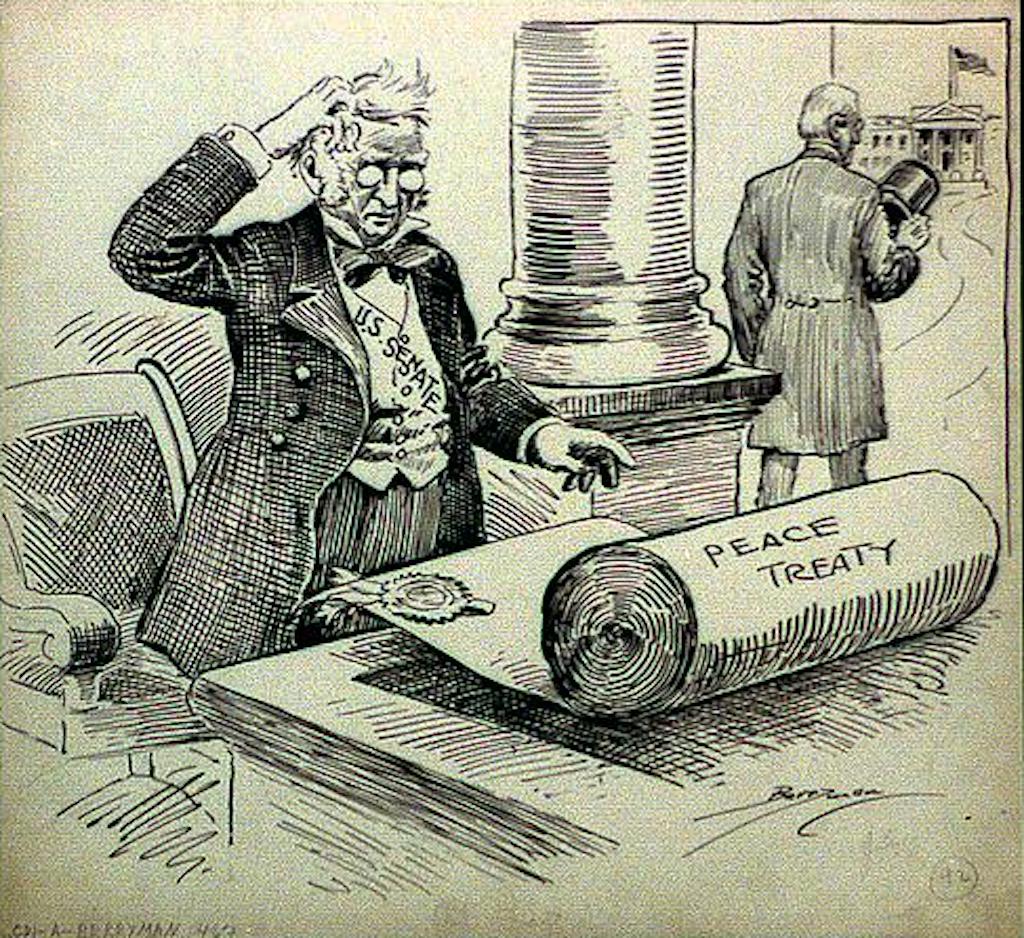
The Treaty of Versailles’ Reception in the Senate
Opposition came from two main groups, the Reservationists, and the Irreconcilables. Led by Senator Lodge, the Reservationists offered fourteen (coincidence?) modifications, or “Reservations” to the treaty. Their concerns focused on Article 10 and the possibility that membership in the League of Nations, as described in the Treaty, could force the United States into economic sanctions against other nations, or possibly even drag the United States back into a conflict as bad as, if not worse than, the “War to End All Wars.” These reservations by themselves would not have prevented ratification of the treaty, but Lodge knew full well that Wilson was unalterably opposed to them, so it seems fairly clear that Lodge had no intention of seeing the treaty approved.
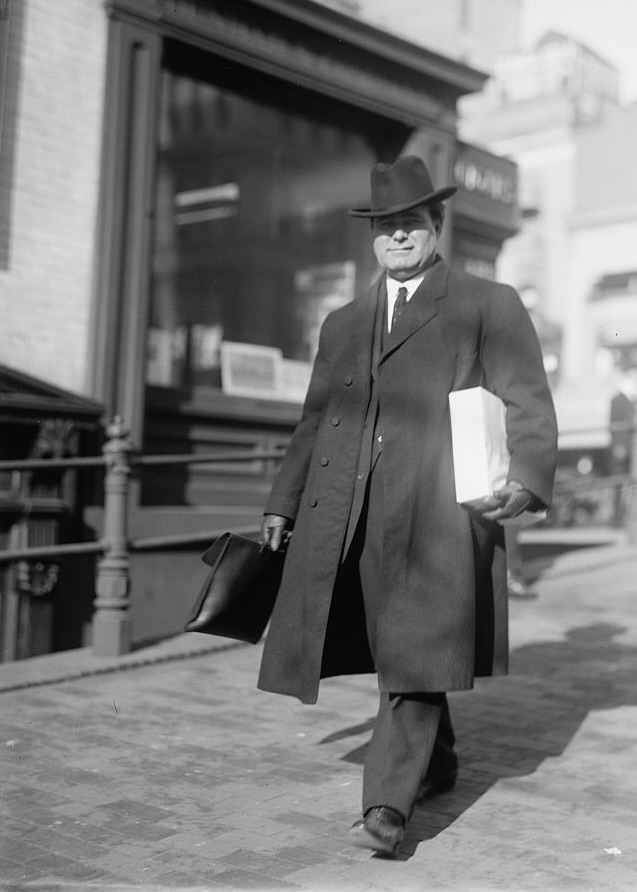
Led by Senator Borah of Idaho, a devout isolationist also known as “the Great Opposer” for his independent stands on many issues, the Irreconcilables were much blunter in their approach. They wanted nothing to do with the Treaty or the League, period. In a nearly two-hour speech, Borah expressed the group’s staunch support for the “the great policy of ‘no entangling alliances’ upon which the strength of this Republic has been founded for one hundred and fifty years…” In response to the Reservationists efforts to modify the treaty he asked, “where is the reservation which protects us against entangling alliances?”
Taking the Treaty of Versailles to the American Public
Recognizing the strength of his opposition, Wilson took his case to the people, touring the United States to gain support for the Treaty. Speaking in Pueblo, Colorado on September 25th, 1919, he argued that “We have heard that we might be at a disadvantage in the League of Nations. Well, whoever told you that either was deliberately falsifying or he had not read the Covenant of the League of Nations.” Time and again, he stressed that membership in the League would not bind the United States to the kinds of commitments feared by both Reservationists and Irreconcilables. Unfortunately for Wilson, a stroke he suffered shortly after the Pueblo speech left him so impaired he was unable to continue his tour.
So, on November 19th, Senator Lodge brought his version of the Treaty, with reservations, to the Senate where it was soundly rejected, in no small part because President Wilson urged Democratic Senators to vote against any version of the Treaty that included amendments or reservations. It was his treaty or no treaty. No treaty resulted, when the Senate next voted on the original version, rejecting it as well.
Lessons of Versailles
The United States concluded a separate treaty with Germany on August 25th, 1921, but never became a member of the League of Nations. It is hard to tell just who was most responsible for the failure to ratify the treaty, President Wilson or the Senate, but certainly the headstrong approach of a President who seemingly deliberately insulted the body responsible for approving the treaty, must weigh heavily in that evaluation.

Rusty Eder currently teaches History (Freshman Humanities History, Traditional United States History, Advanced History, and a semester-long Constitutional Seminar) at West Nottingham Academy, where he also serves as Dean of Faculty and Academy Historian. He earned his BA in History at UMBC and his Master of American History and Government at Ashland University. Additionally, he is a fellow of the James Madison Memorial Fellowship Foundation and has served as an Ashbrook Ambassador at several seminars in his area.


